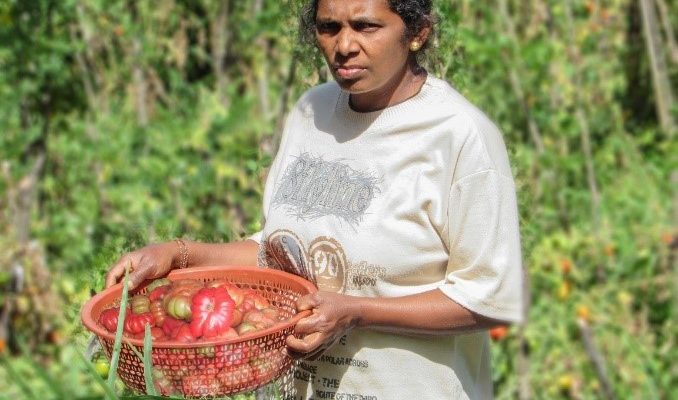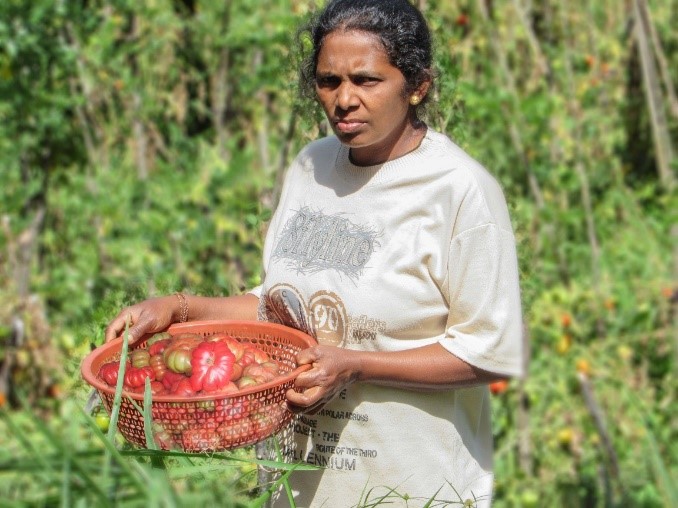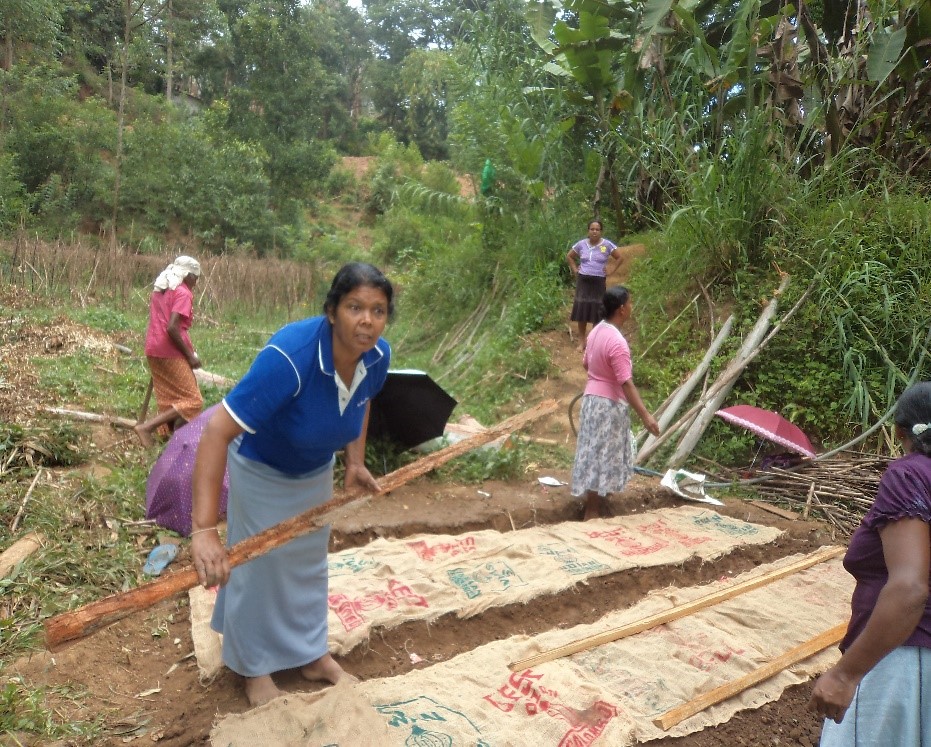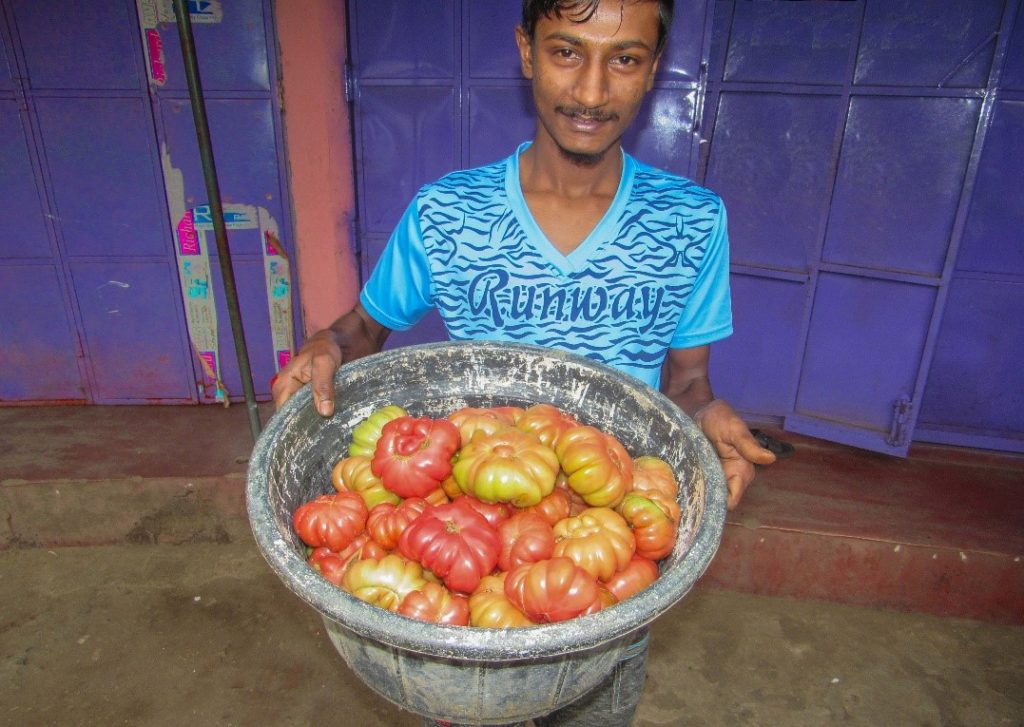Tomato is a food that is enjoyed worldwide. In Sri Lanka, tomato is eaten as it is or used as an ingredient for salad, processed as a juice drink, jam, and tomato sauce, and mixed in almost all types of curries.
In the village of Dodamkumbura, tomato is one of the crops that the farmers grow. Dodamkumbura is a remote village about 200 kilometers from Colombo where 90% of the families make their living through farming—mainly vegetables and paddy. Almost all the family members take part in vegetable farming including preparing the site, making vegetable beds, fertilizing, weeding, watering, protecting, harvesting, taking the produce to the roadsides, and waiting for the lorries to come and collect them. The farmers sell around 30,000 kilograms of their goods daily to traders.
Growing vegetables in the area is not easy because of the sloppy terrain, cold climate, and even attacks from wild animals. Tomato farmers even face additional problems compared to farmers growing other vegetables. Tomatoes are very delicate and difficult to handle. Once harvested, tomatoes cannot be kept for long—they ripe and decay easily so they have to be sold immediately.
Dodamkumbura farmers sell 3,000 kilograms of tomatoes every day at the price the traders set, which is always lower than the prices for other vegetables. The prices are so low that most of the time, farmers get less than the cost of production. They usually just level off the cost of the labor. The traders make a huge profit while the farmers continually suffer. Sometimes, the farmers no longer even bother to harvest the tomatoes and just left them to decay in the farm because of unfair prices.
Going Green after MTCP2 Intervention
The Movement for Land and Agricultural Reforms (MONLAR), through the MTCP2 Program, organized farmers in nine districts in Sri Lanka under the banner of Lanka Farmers’ Forum (LFF). LFF conducted a dialogue with farmers about adding value to their products to help the farmers with their problems.
As a result of these dialogues, a farmer organization in Dodamkumbura consisting of hundreds of members who are vegetable farmers was formed. The Dodamkumbura Farmer Organization is a member of the Nuwara Eliya District Farmer organization.
Advocating change in their farming methods was not an easy task. The farmers were used to selling their harvest in bulk instantly at the farmland itself. In most cases, the traders give loans to the farmers, thus they have to sell them their entire harvest without bargaining on the price. They were stuck in a credit trap.
The farmers were also accustomed to using imported hybrid seeds, which has to be followed by costly and deadly chemical inputs such as fertilizers, pesticides, and weedicides. Not only do they not get any profit from growing tomatoes, but they are also exposed to dangerous chemicals. Sri Lanka is one of the countries experiencing the spread of Chronic Kidney Disease (CKD) which is a result of being exposed to chemical inputs.
After several awareness training programs conducted through MTCP2, the members of the Dodamkumbura Farmer Organization decided to shift to organic farming as they identified it as healthy, environmentally friendly, and cheaper. As many people eat raw tomatoes, it is a responsibility of the farmers to produce them without using chemicals. When the farmers shifted to organic farming, the cost of inputs was lessened they hardly need to get loans. They also shifted to cultivating traditional varieties of tomatoes, including Goraka tomatoes, which are rich in taste, nutrition, and are even heavier.
Linking the farmers to simple modern technology
With support from MTCP, training programs were conducted to give necessary knowledge to the farmers on growing various crops organically and adding value to their produce, specifically tomatoes. The farmers were exposed to simple technologies, which they have never operated, touched, or seen in their whole life. Slowly but steadily, the tomato farmers in Dodamkumbura became part of the whole food production chain, starting from growing raw primary products to producing value-added end products.
Forty-one tomato farmers were organized and among them, potential farmer entrepreneurs were identified to start value adding for the whole group. The group underwent trainings and exposure programs ranging from proper cultivation of organic tomatoes, adding value to the excess tomato harvest by making jams and sauces, making use of small scale machineries, keeping proper accounts, proper storage, packing, and marketing.
The farmer-entrepreneur group now produces 70 kilograms of sauce and 80 kilograms of jam per week. They get around LKR 600 (USD 3) per kilogram of sauce and jam. The farmers observed that there is a satisfactory profit when adding value to the primary products. They get more income from these than selling bulk raw tomatoes to traders. Another important aspect in this whole process is that the youth in these farmer families have shown interest in being involved in the agri-business.
The tomato value adding is happening in the country in a massive scale using some of the local tomato harvests and largely with imported tomatoes believed to be genetically modified. The Dodamkumbura tomato farmers still have a niche market as of the moment. However, many consumers are now concerned with having “poison-free food”. Though vigorous campaigns promoting healthier agricultural practices and healthy eating, a wider market for Dodamkumbura products may be reached in the near future. ###
About MTCP2
The Medium Term Cooperation Program Phase 2 (MTCP2), a five-year capacity building program supported by the International Fund for Agricultural Development (IFAD), the Swiss Agency for Development and Cooperation (SDC), and the European Union (EU), has been implemented in 19 countries across three sub-regions—Southeast Asia, South Asia, and the Pacific—engaging 1,544 sub-national farmers organizations (FOs) with a total membership of around 22 million farmers.
The funding support (total budget of $ 5 million for the whole duration of the project across 19 countries) serves as a catalytic fund that will allow FOs to enhance their capacity to be effective channels of economic services to farmers.
So far, the program has contributed to the formation of strong national platform of FOs with improved capacity to engage in policy processes and mobilize resources from mainstream agricultural development programs like extension services, credit, and pre and post harvest facilities. The program also helped in transforming farmers associations into commodity-based cooperatives to strengthen the role of small-scale farmers within an inclusive and sustainable value-chain.
The program is being implemented by the consortium Asian Farmers’ Association for Sustainable Rural Development (AFA) and La Via Campesina (LVC).







Comments are closed